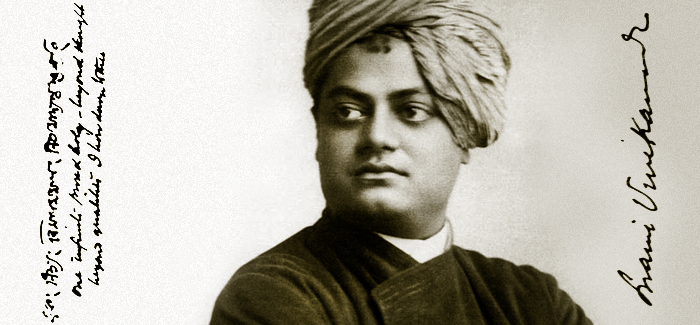
The Hindu monk Swami Vivekananda photographed in Chicago, September 1893. His inscription reads, “one infinite pure and holy — beyond thought beyond qualities I bow down to thee.” {{PD-OLD-70}}
Inspiration from India
The University celebrates ties to India, old and new.
Just a few weeks before dignitaries gathered in India to announce the planned launch of the UChicago Center in Delhi, a quieter celebration in Rockefeller Memorial Chapel marked the 150th birthday of the man who helped build early cultural bridges to the subcontinent.
The Hindu spiritual leader Swami Vivekananda (1863–1902) is revered in India for his 1893 speech to the World’s Parliament of Religions held in Chicago. He preached a radical message of tolerance, declaring the Hindu acceptance of all religions as true. On his trip, the young swami also visited the University and spoke in Cobb Hall. His appearances exposed many Americans to Hinduism and Indian culture for the first time.
Speakers at the 150th anniversary celebration at Rockefeller Chapel—jointly sponsored by the Vivekananda Vedanta Society of Chicago and the University’s Spiritual Life office—noted the swami’s far reaching impact. In 1895 he inspired Irish social worker Margaret Noble to move to India and crusade for the education of girls, a tale retold by Rochona Majumdar, associate professor in South Asian Languages and Civilizations (SALC). The swami also promoted the study of Sanskrit and saw education as the most effective tool for uplifting the masses, observed Gary Tubb, a professor in SALC and faculty director of the Center in Delhi.
In Chicago, some months after his famous speech, the penniless monk even met the rich philanthropist who cofounded the University. Reportedly the swami urged John D. Rockefeller to channel more of his wealth toward the public welfare. “He was able to make people aware of their divine nature, and to help them manifest it,” said Swami Ishatmananda, the minister who recounted the story.
A cardboard cutout of the swami stood on the dais in Rockefeller Chapel, where monks from the Vedanta Society mingled with academics. Clad in a sari, Elizabeth Davenport, dean of the chapel, bowed and offered a “namaste” to the audience and speakers. Before the celebration ended, Martha T. Roth, dean of the Division of the Humanities, announced the selection of two scholars as the inaugural holders of the Indian Ministry of Culture Vivekananda Visiting Professorship. Beginning in 2014, historians Sir Christopher Bayly and David Schulman will teach and lecture at the University on topics relevant to the teachings of the swami.
